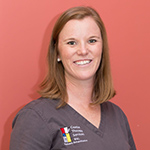SLP Category: Recognized by Apraxia Kids for Advanced Training and Expertise in Childhood Apraxia of Speech
No Records Found
Sorry, no records were found. Please adjust your search criteria and try again.
Google Map Not Loaded
Sorry, unable to load Google Maps API.
- Elizabeth
- Farlow
- Yes
- 1127 Queensborough Blvd, Suite 104
Mount Pleasant
South Carolina
29464
United States - Coastal Therapy Services

Mount Pleasant
South Carolina
29464
United States
Prior to falling in love with Speech Pathology, I had plans to be an early childhood educator. I have roots in literacy and play-based interventions. My style is very child led, modeling much of my approach with a Floortime Model. There is nothing more powerful than play to not only develop trust, but also to keep them engaged in the therapy process. One of the most powerful tools to move a child from motor performance to motor learning is DTTC. I love that the approach, in my mind, is based like a pyramid. You must create the strong foundation to build upon when it comes to mastery of speech movement. I first assist the child in understanding the parameters of movement, or the vocabulary that we will use in which to describe movement of speech, like big/little, fast/slow, or tight/loose. Also when building the base of the pyramid, it's important to develop eye contact to provide the visual and temporal cues necessary to learn movement across syllables and words. In the beginning maximum cues are provided to provide support as they learn the target, and then are faded over time to give the speaker more responsibility for the target words or phrases. The delicate dance between support and independence is evaluated and reevaluated each session in order to to continue moving forward without overloading the motoric system.
I have an open door policy so families are welcome any day and do not need prior authorization to attend. Caregivers are an integral part of the therapy process, and I want each family member to be comfortable with all short and long term objectives. Caregivers learn to gently guide patients and fade supports in order for motor learning and generalization of skills to take place. It is my goal for caregivers and siblings to feel empowered in the treatment process and comfortable addressing goals at home.
AAC can be an integral tool in the treatment of the whole child with CAS. When I get young children with CAS that a preverbal, I do not wait to initiate an AAC evaluation. I also use AAC regardless of age for those that need assistance in conveying their thoughts, opinions and safety concerns to unknown listeners of all ages. It can serve as a tool to repair communication breakdowns, decrease frustrations, and help them to be independent in many different community settings.




